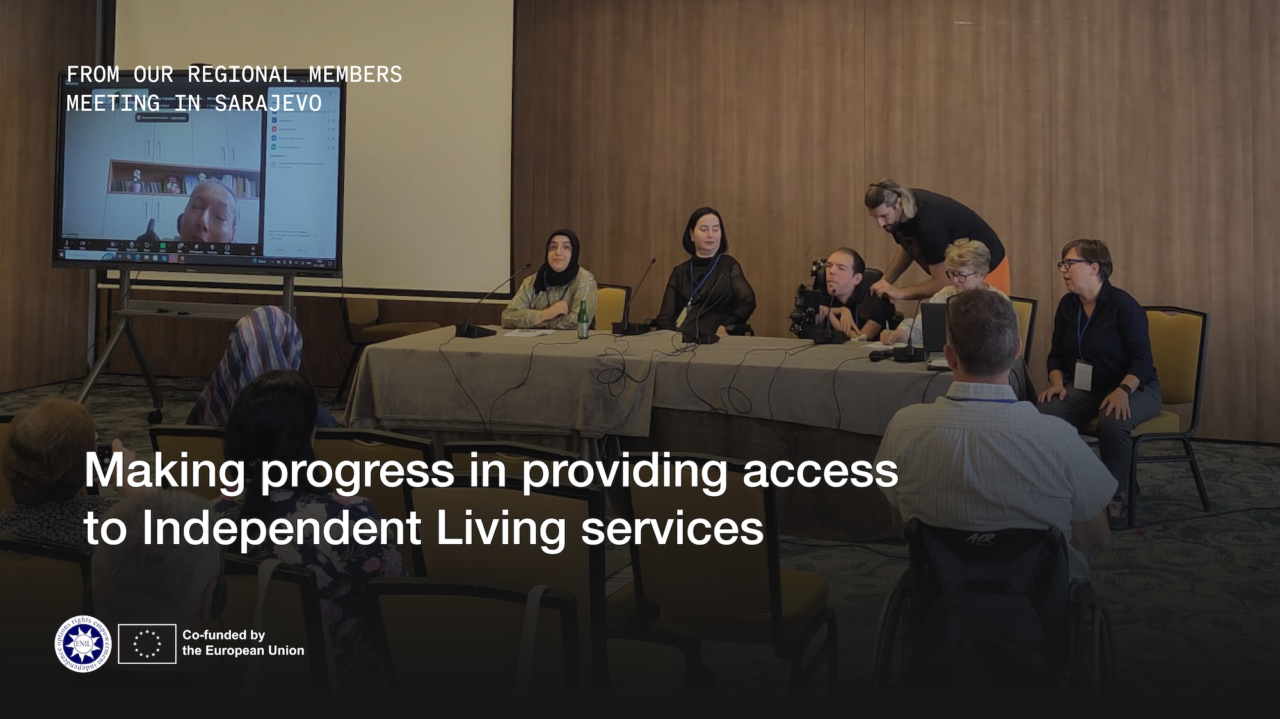During our Regional Members Meeting in Sarajevo, members and allies from across Europe took stock on the state of Independent Living. While the situation remains difficult in many countries there are good news too which give cause for optimism.
To ensure the right to Independent Living can be enjoyed, it is imperative for the 18 pillars of Independent Living to become reality. To which extent is access to Independent Living services improving?
Norway: Access to services becomes a right
The most positive news was reported by Martine Eliasson from Independent Living Norway. In 2013, Norway ratified the United Nations Convention on the Rights of Persons with Disabilities (UN CRPD). As in many countries, it was decided that national law should retain primacy over the provisions of the Convention, making it difficult to advocate for the provision of Independent Living services and to litigate in court. Recently, the decision was taken to in incorporate the UN CRPD into the national human rights law, thereby reversing this hierarchy. Once the necessary legal changes are complete, authorities will have to grant access to services like personal assistance on a larger scale.
An Independent Living positive list at the EU-level
The ENIL secretariat itself had some good news to report. In 2024, the European Commission adopted a Guidance to Member States on Independent Living and inclusion in the community, a document which provides advice on how to use EU funds to finance Independent Living services. ENIL advocated strongly for an incorporation of services along the 18 Pillars of Independent Living into the Guidance. Because the Guidance is not legally binding, many observers tend to dismiss the relevance. However, we now for the first time have an official positive list adopted by the European Commission, recommending the financing of services in line with the 18 Pillars of Independent Living. This success was possible, largely due to the efforts of the ENIL secretariat.
Among the services supported by the Guidance is most importantly personal assistance. It is also recommended to use personal budgets to facilitate the tailoring of funding. Establishing this close link between personal budgets on personal assistance is very important. It is also recommended to finance peer support and Centres for Independent Living. The expansion of this type of service providers is seen as crucial by the Independent Living Movement.
As a next step it is now crucial to use this Guidance to advocate for the allocation of EU funds for the financing of concrete projects.
A new personal assistance scheme in Croatia
Good news also from Croatia. In 2023, the national parliament adopted a new personal assistance act, establishing a new PA scheme. Due to this new law, the provision of personal assistance will no longer be a voluntary service but a right. A budgetary envelope of EUR 176 million per year has been allocated. It is planned that 15 000 disabled people will receive assistance through the scheme.
Greece in deadlock
Antonia Trikalioti from I-Living Greece gave a sobering update on the state of Independent Living in the country. According to Antonia, despite many efforts institutions remained a key part of national disability policy. The existing deinstitutionalisation plan represented nothing more than a formality. Thousands of institutions remained in operation. The political debate was being dominated by arguments in favour of institutions. Group homes were being presented as the solutions. EU funds were used to finance the expansion of this type of service. Despite extensive evidence presented, the EU leadership was ignoring the situation.
Disability rights as a paper tiger in Turkey
Melike Bal from Turkey reported there was a stark contrast between the state of play presented on paper and the reality in the country. According to Melike, Turkey presented itself as a proud state party to the UN CRPD and the optional protocol. The government was claiming to follow the social model of disability. Official data indicated only 7% of the Turkish population was disabled.
Melike painted a much bleaker picture of the real situation. The countrys´ institutions were fraught with violence. Frequently news about deaths were surfacing. People with intellectual and psycho-social impairments were usually put under guardianship, often exercised by family members. To date, there was no personal assistance system in Turkey. When it came to receiving support, people were dependent on the family. If it was not possible for the family to provide support, institutions were the only solution.
The struggle continues
The state of play presented during the regional members meeting shows that with steady work, progress in providing access to Independent Living services can be achieved. The legal changes in Norway and Croatia will improve the lives of many disabled people. The new Guidance on Independent Living could make it possible to redirect more EU funding into projects providing added value.
The situations in Greece and Turkey remind us that there are immense challenges ahead.



